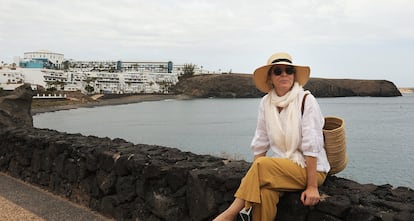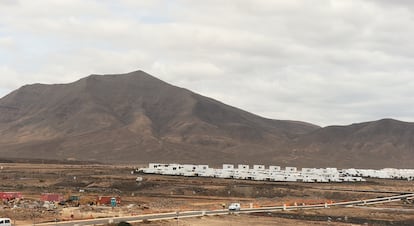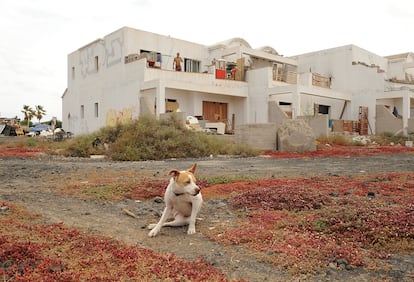Lanzarote, home to Spain’s stretch of coast with the highest number of illegal hotels
Years of legal fights against untrammeled development have left a trail of half-built structures and establishments that are operating without a license


There is no stretch of coastline in Spain with a greater number of illegal hotels than on the Canary Island of Lanzarote, particularly in the small municipality of Yaiza. There, in the middle of a spectacular volcanic landscape of black rock, stands the Sandos Papagayo hotel, a white mass of concrete on the beachfront that, apart from having its license revoked in 2007 by the Canary Islands High Court, also violates the law because it is too tall and encroaches on a public pedestrian walkway to the beach.
Often compared to the Algarrobico hotel in Almeria – another symbol of uncontrolled development – there is one main difference between these two vast tourist establishments that have been the target of years of litigation: the Lanzarote resort is open to the public. In this southern corner of the island, there are also other illegal hotels, such as Princesa Yaiza, Son Bou and Dream Gran Castillo. Together they are considered the four most serious cases of the 44 establishments to have their licenses annulled by the courts in Lanzarote.
A unique island, Lanzarote is listed in its entirety as a Unesco Biosphere Reserve and was a pioneer in curbing its urban growth 30 years ago after the artist and environmental activist César Manrique spearheaded a local campaign to protect the fragile ecosystem on the island.
But Lanzarote has also seen the worst of real estate-driven corruption come to light. Of the seven municipalities that make up the island, six have seen a mayor convicted for a crime related to construction or real estate; namely in Yaiza, Teguise, Arrecife, San Bartolomé, Haría and Tinajo; and there is still a key trial in the pipeline. Councilors, city planners and entrepreneurs have fallen like dominoes, many ending up in the Tahiche local prison. Even the almighty Dimas Martin, former president of the Lanzarote island council and one-time leader of the Independent Party of Lanzarote (PIL), was eventually caught by the long arm of the law. However, the buildings themselves have been harder to take down: the legal battle against urban corruption has left a trail of concrete skeletons and illegal tourist establishments, with some such as the Sandos Papagayo hotel having no easy solution.
When I had to take a statement from a mayor in a case of real estate corruption, the prosecutor did not show up, the judge did not know anything and I was alone facing 15 defense lawyersIrma Ferrer, activist lawyer
“Lanzarote has not been more corrupt than other regions. What has happened here is that there has been a reaction against unbridled urban development, resulting in legal action that has brought cases of corruption to light,” says Dolores Corujo, the current president of the island council, who stresses that two municipalities, Yaiza and Teguise, “granted a multitude of licenses in violation of the island’s regulations.” According to Corujo, “the [hotel] Son Bou has a demolition order from Yaiza Town Hall as it is considered illegal and impossible to legalize. The property owners have appealed and we are awaiting the court’s decision. As for the Princesa Yaiza, it has also been affected by the partial annulment of the Yaiza General Zoning Plan [which tried to legalize it], making it illegal.”
The biggest struggle right now is with the Sandos Papagayo hotel. According to the island council, this hotel is probably committing the biggest urban violation on the coast, but both the company behind it and Yaiza city officials are trying to salvage it. “We feel that the hotel can be legalized,” says Daniel Valenzuela, lawyer for this tourist complex, who explains that the legalization process could involve the elimination of 111 of its 475 rooms and a partial demolition of its dome. “There is still a long way to go before we can talk about the demolition of the hotel,” he says. However, lawyer Irma Ferrer, representing the citizens’ association Urban Transparency, has a very different take on it, believing it impossible to solve the fact that the building occupies part of the pedestrian access to the beach, which is now reached via the hotel, using an elevator.
The Papagayo hotel is one of the establishments that was given a license during a four-day storm of urban corruption in 1998. As highlighted by the sentence issued by the Provincial Court of Las Palmas in the so-called Yate case – a name that combines the names of the municipalities of Yaiza and Teguise – the then-mayor of Yaiza, José Francisco Reyes, granted a glut of licenses for personal profit, authorizing the construction of more than 1,500 tourist beds in a single day. According to court documents, on May 29, 1998, the city received paperwork for the construction of seven large hotels. By June 1 these were all approved. As the ruling points out, this was done with “full knowledge of the illegality of their concession due to a clear inconsistency with the town planning regulations in force at the time.”
The island’s ecologists who started the El Gincho organization with artist César Manrique had been confronting bulldozers for years to protect this incredible landscape shaped by lava, but it was the lawyer Ferrer who convinced her fellow environmentalists that they had to pay more attention to the money, focusing on criminal proceedings to fight corruption. According to Ferrer, even then the procedure was far from straightforward. “I used to go to misdemeanor trials in which a dog had bitten a neighbor and there was the judge, the public prosecutor, the attorney for the private prosecution, the defense lawyer and the insurance company representative,” she says. “But when I had to take a statement from a mayor in a case of real estate corruption, the prosecutor did not show up, the judge did not know anything and I was alone facing 15 defense lawyers.” According to Ferrer, she was not taken seriously until people began to be sent to jail.

The ramping up of the investigation into urban crimes here had much to do with the arrival on the island of the prosecutor Ignacio Stampa and, sometime later, of Javier Ródenas. “Lanzarote is very particular; the power of local bigwigs is striking; my feeling upon arriving here as an outsider was that there were various island chiefs that nobody would think of questioning or snitching on,” says Stampa. “Besides, it is a very small place and there is no one who is not a relative or a friend of a corrupt individual or businessman with control over funding, so it is very difficult when you find yourself in a position like Irma’s or the one I was in, because you are the enemy. They go for the jugular.”
The story took a new twist when a Socialist Party (PSOE) politician, Carlos Espino, reported a bribe from a businessman to unblock a development project, which led to the introduction of undercover officers from the Central Operational Unit (UCO) of the Civil Guard, in what was dubbed Operation Union. “The moment they started tapping phones on this island it all came out, absolutely everything,” says Isabel Lusarreta, director of La Voz de Lanzarote news organization who has dedicated much of her time to following the trail of corruption here. “One [tapped] phone call led to another, throwing up questions that had absolutely nothing to do with what was originally being investigated, so Operation Union ended up being broken down into several investigations.”
In pursuit of the “boss” of a scheme to collect illegal commissions, UCO officers used wiretaps that led them all the way to Tahiche prison. In one of the most unusual scenarios in the fight against corruption in Lanzarote, Dimas Martin, a former president of the island council, former mayor and leader of the Lanzarote Independent Party (PIL), was arrested while he was actually serving an eight-year sentence for the irregular construction of an agro-industrial complex in Teguise. Despite being locked up, the politician had been issuing precise instructions to councilors in the municipality of Arrecife to obtain payments from businessmen, as demonstrated in recordings and in the documents found in his cell.
In the ruling of the Provincial Court of Las Palmas of 2019 on the main thrust of Operation Union in which Martin was again sentenced to prison along with two Arrecife councilors and seven others, the unique way in which he used his power over others emerged: “During the trial, a particularly embarrassing conversation was heard between Mr. Dimas Martin and the then director of the Tahiche Penitentiary Center – and we use the adjective embarrassing with respect to the latter interlocutor,” the court concluded, referring to a recording in which the corrupt politician tells the prison director that he will talk to a councilman to “see where we can place you.”

Ferrer goes to Tahiche prison every Friday as a volunteer to give legal advice to prisoners, but she avoids Module 2, because “that’s where everyone is.” After years of trials, insults and pressure, she recognizes that the struggle has taken its toll, particularly given the size of the island. However, she believes she and others did the right thing. “It was what we had to do, otherwise we would be much worse off; even if they end up kicking us out and we have to leave the island,” she says. “We’ve got so far; some have escaped, but the law has been flagged up; now we are fighting for it to be carried out.”
In the meantime, concrete eyesores litter the island: half-built apartments and bungalows whose construction has been halted on the basis of some illegality or another. Promoted in their day as upmarket tourist complexes, many are now no more than ruins covered with graffiti and filled with garbage, home to the homeless and squatters. In one of these ghost developments in Costa Teguise, on plot 214 of the Club del Rey apartments, a man shouts from a balcony: “And we’re the criminals?”
Tu suscripción se está usando en otro dispositivo
¿Quieres añadir otro usuario a tu suscripción?
Si continúas leyendo en este dispositivo, no se podrá leer en el otro.
FlechaTu suscripción se está usando en otro dispositivo y solo puedes acceder a EL PAÍS desde un dispositivo a la vez.
Si quieres compartir tu cuenta, cambia tu suscripción a la modalidad Premium, así podrás añadir otro usuario. Cada uno accederá con su propia cuenta de email, lo que os permitirá personalizar vuestra experiencia en EL PAÍS.
¿Tienes una suscripción de empresa? Accede aquí para contratar más cuentas.
En el caso de no saber quién está usando tu cuenta, te recomendamos cambiar tu contraseña aquí.
Si decides continuar compartiendo tu cuenta, este mensaje se mostrará en tu dispositivo y en el de la otra persona que está usando tu cuenta de forma indefinida, afectando a tu experiencia de lectura. Puedes consultar aquí los términos y condiciones de la suscripción digital.








































